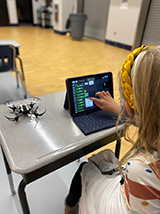
BERLIN – A drone program at local elementary schools is encouraging girls to explore STEM fields.
“Fly Like a Girl,” a new afterschool drone program, wrapped up at Showell Elementary and Ocean City Elementary schools last week. Teachers are hoping the program will help interest girls in science, technology, engineering and math.
“I’m hoping to inspire younger girls,” said Valerie Zienty, the Worcester Technical High School teacher who taught the program at Showell. “Girls can do anything.”
Zienty, a pre-engineering teacher at Worcester Tech, said she came up with the idea of a drone program for young girls this summer and wanted to see how elementary school kids would respond. At the high school level, her classes are typically only 10-15% girls.
“Girls have a lot of power but as they go through high school they lose confidence,” she said.
To encourage more girls to consider the STEM fields, she wants to get them interested in science and technology early on. The afterschool drone program, which was offered to girls in third and fourth grade, is one way to do that. Thanks to a grant from the Maryland State Department of Education, 24 drones were purchased for afterschool programs at Ocean City and Showell.
“We think if we capture their interest early they’ll see the value of pursuing a career in robotics or computer science,” said Diane Stulz, coordinator of instruction. “In computer science and technology careers there are so few women yet there are so many jobs open.”
In recent years, Stulz said that the school system has expanded its efforts to promote STEM in the elementary schools. Students as young as five have done projects like the “code and go mouse.”
“They program it based upon their answers to math problems,” she said. “There’s a maze and if they’ve gotten all the answers right they get to the end of the maze.”
She said the elementary school computer science and robotics programs were a fun way to expose kids to STEM.
“This is a way for our students to begin at an early age where they don’t have a preconceived notion of what computer science looks like or what a computer scientist does,” she said.
At Showell, Zienty said that over the course of eight weeks the girls in her program—most of whom had never touched a drone—learned to program, control and make videos with drones.
“They problem solve while they’re having fun,” she said.
While some were nervous because they started the program with no knowledge of drones or how they worked, Zienty reminded them they would learn along the way.
“An expert of anything was once a beginner,” she said. “Making mistakes is okay. That mentality is good for them whether it’s drones or not.”
Stulz agreed.
“One of the things that’s great is there’s no ‘I failed,’” she said. “It’s ‘I’ve got to fix it.’ That’s a mindset I’d like to see all our kids learn.”
While whether the program is offered again will depend on funding, Stulz noted that because the state grant had been used to purchase equipment—the drones and a practice field—it would be on hand for future use.

